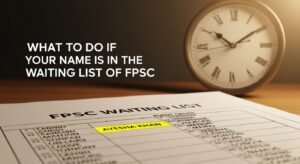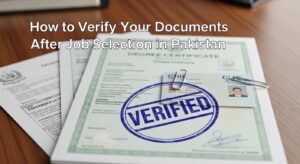Getting selected for a job in Pakistan is an exciting achievement, but the period that follows is equally important. Between the first congratulatory call and becoming a confirmed employee lies a structured process involving offer letters, documentation, background checks, medical examinations, resignation from a previous job, joining day formalities, probation, and career growth. By understanding each step in advance, you can avoid delays, reduce stress, and step into your new role with confidence.
Receiving and Reviewing the Job Offer
The process usually begins with a verbal offer. After completing interviews, candidates often receive a phone call from HR or the hiring manager confirming selection. This call may briefly mention the role, salary expectations, and the expected joining date, but it is not legally binding. It serves as an initial confirmation of interest and an opportunity for both sides to align expectations.
The written offer follows shortly after and is the most critical document. A standard job offer letter in Pakistan includes the job title, department, reporting manager, start date, salary details, allowances such as house rent, fuel, and medical, working hours, probation period, leave policy, termination clauses, and sometimes special conditions like non-compete agreements or background checks. Candidates should review every detail carefully, compare it with industry standards, and raise any concerns before signing. Once satisfied, the offer can be formally accepted through email, often with a signed copy of the letter attached.
Documentation and Background Verification
Once the offer is accepted, the next step involves submitting all required documents. Companies usually request a CNIC copy, educational certificates, experience letters, domicile certificate, passport-sized photographs, proof of address, bank account details, and in some cases professional licenses such as PEC or PMC registration. Increasingly, vaccination certificates are also required. Some organizations demand HEC attestation for degrees, and those with foreign qualifications must provide an equivalency certificate.
Employers also conduct background verification in Pakistan. This includes checks with universities to confirm degrees, employment verification from previous employers, reference calls, NADRA record checks, and in sensitive sectors like banking, police verification. Delays can occur, so it is best to keep updated contact information for references and previous employers, and to prepare documents well in advance.
Medical Examination Requirements
For many organizations, a medical examination before joining is mandatory. Candidates are referred to a panel clinic where routine tests such as blood analysis, X-rays, blood pressure, eye tests, and screenings for infectious diseases are performed. Results are usually shared directly with HR. Pre-existing conditions should be disclosed honestly, and if delays occur in reports, candidates must inform HR promptly to avoid misunderstandings.
Resignation from Current Job
For those already employed, resignation is the next step. This begins with submitting a formal resignation letter that respects the notice period, which is often 30 days. Employees should avoid resigning before receiving a written offer from their new employer. During the notice period, responsibilities must be handed over, and all company property returned. In return, employees should ensure they receive their experience letters and pending dues. Counter-offers from the current employer are common, but candidates must remain clear about their priorities. Having every step documented in writing helps avoid disputes.
Pre-Joining Communication
After resignation and clearance, HR from the new organization typically reaches out to confirm the joining date and provide first-day instructions. This may include reporting details, dress code, and documents to carry. For those relocating to another city, some companies provide accommodation assistance or at least recommendations. Employees should respond promptly, clarify doubts, and, if policy documents or induction material are shared in advance, go through them carefully to be better prepared.
The Joining Day Experience
The first day at a new workplace sets the tone for the future. Arriving early, dressed appropriately, and carrying all required documents creates a strong impression. HR usually guides employees through formalities such as signing contracts, verifying originals, biometric registration, and issuing access cards or laptops. An office tour and introductions to colleagues follow, helping new employees adjust to the environment.
Orientation and Induction
Most organizations in Pakistan arrange orientation programs for new employees. These cover company history, mission and vision, leave policies, codes of conduct, disciplinary procedures, and health and safety protocols. Depending on the industry, specialized training may also be included, such as compliance training in banks or IT systems training in tech firms. Though information overload is common, taking notes and reviewing materials later ensures no detail is lost.
Understanding the Probation Period
Perhaps the most crucial stage after joining is the probation period in Pakistan, which usually lasts three to six months. During this time, supervisors closely observe performance, punctuality, adaptability, and team interaction. Employees may be assigned clear KPIs, and some benefits such as bonuses or insurance may remain limited until confirmation.
At the end of probation, three outcomes are possible. If performance is satisfactory, employees receive a confirmation letter granting permanent status and full benefits. If progress is incomplete but potential exists, probation may be extended. In cases where performance falls short, termination is possible. To maximize chances of confirmation, employees should keep track of achievements, proactively seek feedback, and align their work with organizational expectations.
Settling In and Planning Career Progression
After confirmation, employees begin to integrate into workplace culture and explore long-term career paths. Building good relationships with colleagues, attending social events, and participating in team activities helps create a positive reputation. Discussions with supervisors about promotion cycles, performance reviews, and training opportunities are important for future growth. At the same time, HR usually activates benefits such as health insurance, provident fund, and gratuity. Employees should confirm their enrollment and familiarize themselves with the claims process to fully utilize these entitlements.
Common Issues After Getting Selected for a Job
At each stage, challenges may arise. Offer letters can be delayed or unclear, documents may be incomplete or unattested, background checks can face verification delays, medical tests might uncover unexpected issues, current employers may resist resignations, or probation may feel stressful due to unclear expectations. The best way to handle these problems is through preparation, documentation, and proactive communication. Keeping scanned copies of all certificates, maintaining written HR correspondence, starting attestations early, and treating colleagues and supervisors respectfully ensures smoother progress.
Conclusion
The journey from job selection to confirmed employment in Pakistan is not just a matter of signing contracts and showing up for work. It is a structured process with multiple checkpoints, each requiring preparation and professionalism. By understanding what to expect in terms of job offers, documentation, background checks, medicals, resignations, joining day procedures, orientation, probation, and eventual confirmation, you can navigate this transition successfully. With patience, communication, and the right attitude, the period between offer and confirmation becomes not a hurdle but a launchpad for long-term career growth.
Resources
- Ministry of Law and Justice, Pakistan: molaw.gov.pk
- National Database & Registration Authority (NADRA): nadra.gov.pk
- Higher Education Commission (HEC): hec.gov.pk
Frequently Asked Questions
When will I get my job offer letter after being selected?
Most companies send the offer letter within a few days to a week after telling you verbally. If you haven’t received it after a week, contact HR to follow up.Can I negotiate my salary or benefits before accepting the offer?
Yes, you can politely negotiate your salary or any benefit before you sign and return the offer letter. It’s best to do this by email.What if I lose my offer letter or email?
Contact HR and request another copy. They usually resend the document on your official or personal email.Which documents do I need to provide for joining?
Most companies ask for your CNIC, educational certificates, experience letters, recent photographs, and bank account details.What does “background verification” mean?
This is when the company checks your degrees, previous jobs, and sometimes police records to make sure everything you claimed is true.What if my previous employer is not responding to reference checks?
Tell your new HR the problem and, if possible, give an alternative contact person, old salary slips, or other proof of employment.Do all companies require a medical check-up before joining?
Not all, but many large companies, banks, and government jobs require a basic medical fitness test before you start.What happens if I find a health problem in my medical test?
Tell the company doctor and HR honestly. For most basic conditions, this will not affect your job unless it directly hinders your ability to work.How do I resign from my current job the right way?
Submit a written resignation as per your contract’s notice period. Always resign after you have the new job offer in writing.What if my current employer does not accept my resignation?
Remain polite but firm and submit the resignation through email for written proof. Most companies cannot legally force you to stay.Can I join a new job before my notice period ends at my old job?
Only if your current employer allows early release. Otherwise, serve your full notice period to avoid trouble and missing experience letters.What original documents should I bring on the first day?
Bring originals and copies of your CNIC, degrees, experience letters, and photographs. HR will check them and return the originals.Will my new company help me if I need to relocate?
Many companies offer relocation help or recommendations, especially if you’re moving to a new city. Always ask HR in advance.What is an induction or orientation session?
This is a session (or series of sessions) where HR explains company rules, culture, benefits, and sometimes gives training about your job.What should I do if I miss part of the orientation?
Ask HR for a summary, the slides/policies shared, and if you can join the next session.How long does the probation period last?
Usually, between 3 and 6 months. HR will tell you the exact duration in your offer letter.What is expected of me during probation?
You should focus on learning your job, meeting targets, being on time, and showing a good attitude.Can I be fired during probation?
Yes, companies can let you go with short notice if you do not meet expectations, but this is rare if you do your job well.When do I become a permanent employee?
Once you successfully finish your probation, you will get a confirmation letter from HR.What benefits can I expect after becoming permanent?
Common benefits include health insurance, paid leave, provident fund, bonuses, and sometimes a gratuity or pension.What do I do if I lose or break company property (like a laptop)?
Inform your supervisor or HR immediately. Most companies will guide you on the replacement or recovery process.Do I have to join a union or association?
No, in most private jobs, joining a union is optional and up to you.What if I have a problem with my manager or a colleague?
First, try to resolve it directly and politely. If you can’t, speak to HR or use the company’s complaint procedure.How do I get my salary?
Your salary is usually deposited into your bank account every month on a fixed date, as stated in your contract.How can I use my medical or health insurance?
HR will provide you with an insurance card and details. Follow the company’s claim process or ask HR if you need help.Can I take leave during my probation period?
Usually, you are allowed only urgent or sick leave in probation (with proof); annual or casual leave starts after confirmation. Ask HR about your company’s rules.What should I wear on my first day?
Wear formal or business-casual clothes unless HR tells you there’s a casual dress code. Neat and tidy dressing leaves a good impression.How do I find out about my career growth in the company?
Ask your manager or HR about promotion policies, training, and how often you’ll have performance reviews.What if I find errors in my job contract or offer letter?
Do not sign until the errors are corrected. Contact HR and have them make the changes in writing.Can I back out after accepting the offer?
Yes, you can withdraw before joining, but inform HR as soon as possible so you don’t damage your reputation with them for future jobs.










